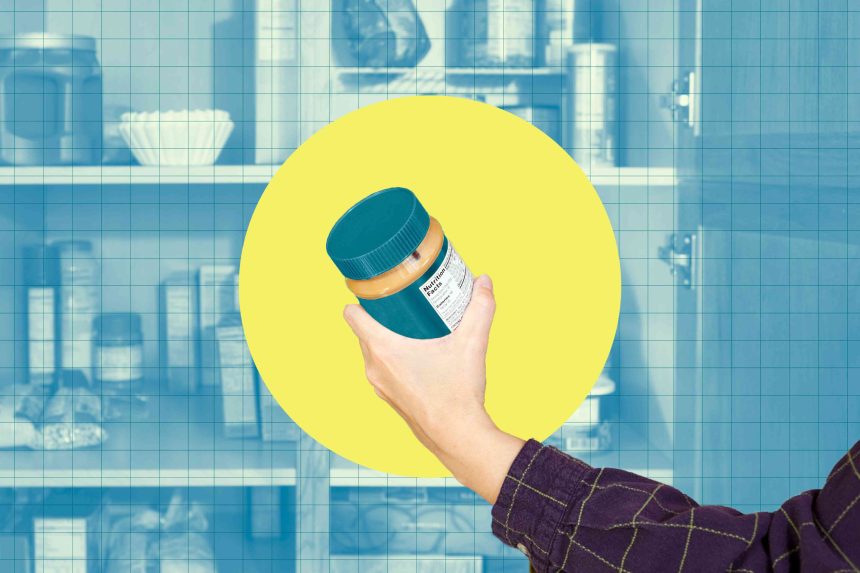Peanut butter might be one of the toughest workhorses in your kitchen. Toss it onto toast, and you’ve got breakfast. Scoop it into your ice cream, and you’ve upgraded a midnight snack to dessert. Combine it with a few pantry staples, and you’ve got a decadent sauce. Plus, it’s packed with protein, it’s budget-friendly and it has a long shelf life. (Not to mention, it’s pretty tasty too.)
But is it safe to just stick an open jar in your pantry? I was confronted with that very question when I found a jar of Skippy’s in my fridge at home. I had grown up in a “peanut butter is in the pantry” household, but my husband? He always thought it had to be kept in the fridge. So I turned to the experts at Skippy and the National Peanut Board to put the debate to rest.
“The bottom line is that peanut butter is a hardy food in more ways than one,” Markita Lewis, M.S., RD, a registered dietitian with the National Peanut Board, said. “You don’t have to baby it.”
Is It Safe to Store Peanut Butter in the Pantry?
Peanut butter may be pretty hardy, but is it safe left open at room temperature? “Skippy peanut butter is totally safe at room temperature,” Sam Hovick, brand manager at Skippy, told me. It’s also perfectly fine to keep your peanut butter in the fridge, he added—whichever you choose is up to personal preference. If you prefer to have peanut butter that’s easy to spread, the pantry is the best place to store it. If you are one of those folks who likes to eat it by the spoonful, then the fridge is likely for you, as it will be firmer.
The only thing to keep in mind is your peanut butter’s shelf life, Lewis added. An open jar will last about three months in the pantry before it’s past its prime. (However, she noted that most American households go through peanut butter much faster than that.) You’ll be able to extend that shelf life a bit longer if it’s stored properly in the fridge.
What About Natural Peanut Butter?
Conventional peanut butters are formulated to be shelf-stable. Often, natural peanut butters lack the stabilizers, such as hydrogenated vegetable oils, that allow conventional peanut butter to be kept at room temperature. If your natural peanut butter is homemade, comes from a specialty grocery store or contains only peanuts and salt, it’s best to store it in the fridge to maintain its quality, shelf life and taste.
That said, Hovick noted that Skippy Natural Peanut Butter does not need to be stored any differently than the others in Skippy’s product line. “They are formulated and processed in a manner that helps to contain oil separation,” he explained.
The same guidelines also apply to other nut butters, such as almond and cashew butter. Seed butters, like SunButter, also can be kept at room temperature.
Storage Tips
While storing your peanut butter in either the fridge or at room temperature is food-safe, there are some tips to keep in mind to ensure that it stays as tasty as the day you cracked into a fresh jar. If you’re storing your peanut butter out of the fridge, you’ll need to ensure that it’s in a cool, dry place, as excess heat and humidity can cause it to spoil more quickly. It also should be in a dark place, as bright sunlight can degrade the quality. A pantry closet or cabinet is the perfect spot.
When it comes to the fridge, you’ll want to make sure that open jars aren’t stored next to anything with a strong odor, Lewis said. You’ll also want to avoid storing the jar on the door, as the foods stored there will experience the most drastic temperature fluctuations. “The top shelf tends to have the most consistent temperature and is great for ready-to-eat foods like peanut butter,” she said.
How Can I Tell If My Peanut Butter Has Gone Bad?
Besides just checking the expiration or “best by” date, there are a few telltale signs your peanut butter has gone bad. The first is its odor: if it smells bitter, metallic or stale, it’s likely time to toss it. Rancid peanut butter will also be dried out or look a bit darker in color, Lewis said.
The Bottom Line
It’s safe to store conventional peanut butter in either the fridge or at room temperature, depending on your preference. Peanut butter that is stored at room temperature will be easier to spread, but keeping peanut butter in the fridge once the jar is opened can help extend its shelf life. Most natural peanut butters should always be refrigerated. If storing commercial peanut butter at room temperature, be sure to place it in a cool, dry and dark place.







